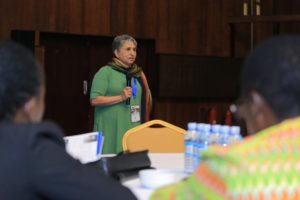So much to digest from the recent meeting of The Pan-African Literacy for All meeting in Uganda.
As a CODE Board member, volunteer and recently retired academic, I travelled to Uganda to introduce the CODE research initiative known as “Context Matters” to participants at the Pan African Literacy for All (PALFA) meeting.
The goal of Context Matters, both conceptually and practically, is to support African research and researchers. Instead of simply applying findings from western scholars to teachers and students without regard to context, CODE has solicited proposals from the countries where we have programs and invited top African scholars to evaluate the importance and impact of the submissions.
In the first round, four grants of $10,000 were awarded to researchers interested in gathering and analyzing information about the educational challenges girls and women face in their respective communities. I had the pleasure of introducing the Context Matters program in a keynote address and my presentation was followed by reports from the four winners from our first round of Context Matters research grants.
 The program is going exceptionally well. Within a year CODE will have the first set of research reports ready to share, and as I write this blog, the second set of proposals is being adjudicated. But for those seeking a sneak preview of what’s happened to date, I offer the following.
The program is going exceptionally well. Within a year CODE will have the first set of research reports ready to share, and as I write this blog, the second set of proposals is being adjudicated. But for those seeking a sneak preview of what’s happened to date, I offer the following.
Mwangi Ndirangu’s study of extra-curricular literacy clubs in rural Kenya clearly points to the importance of actively engaging girl students’ in conversation and writing. The pedagogical practices employed, though surely new in the schools where they were being studied, would be relatively familiar to educators trained in Canada or other Western countries. What surprised and delighted all of us however was the reaction of “non-treatment” educators, i.e. the administrators and teachers in the school where the literacy clubs were housed. So impressed were they with the practices and results, they expressed interest in taking up such practices in their regular classrooms.
Colomba Muriungi also reported about her work in a literacy club environment, but one that focused not specifically on pedagogy, but rather on the content of the girls’ educational lives. In the northern Kenyan rural schools where the program takes place, girls typically travel, often alone, up to 10 kilometers through the bush to reach school each day. On their trip home they are expected to gather firewood and then collect water when they arrive as well as help with cooking, cleaning and childcare. In addition, they are plagued by the challenges of menstrual hygiene management. When the family economy falters, they are sometimes sold for dowries. The health and psychological risks of female genital mutilation are multiplied by a social system that ostracizes those not yet circumcised. Tales of witchcraft trouble their dreams. Columba has collected pages and pages of such reports and struggles herself to figure out what form(s) might most powerfully be used to share her data and impact her readers in the education community and beyond.
Helen Inyega, the most senior of the researchers CODE supported in this first round of grants, used her funds to engage in a fascinating and disturbing study of college freshman, many of whom were thought to drop out due to pregnancy or early marriage. In fact, the consequences of their behavior may be direr. Record numbers of girls find themselves in abusive relationships, too often resulting in death. Others engage in relationships with older “sponsors” who trade sexual favors for apartments, tuition and flashy clothes. The college faculty believed that the girls were simply not educated about sexuality and fell victim due to lack of information, but in the first part of Inyega’s study, found that, in fact, the girls were intellectually aware of the dangers to their health and well-being. Contrary to the understanding of faculty, the answer was not more sex education. In the next phase of her study she will follow college freshman to better understand the social milieu that supports engaging in dangerous practices, as well as possibilities for developing more proactive strategies for building stable, future-looking careers.
Helen, who actually received her PhD in the US and has published widely, provided a perfect contrast to Mekonnen Esubalew, an awardee from Ethiopia who had never before travelled outside of his home country and never before attended an international conference. In the few days our CODE team spent together, we saw his self-image as well as his research change. Since Mekounen is looking at ESL texts in terms of gender bias for his research he was able to meet with other scholars from across the continent who had engaged in similar studies. Hila Olyan, Director of International Programs at CODE and I also had an opportunity to meet with Mekonnen at length to discuss what information he as an Ethiopian scholar might gather that would not be available to those from outside—something beyond counting the number of jobs depicted for males and females or the use of active or passive verbs. Listening to his colleagues he came to understand the value of considering the meaning students make of texts as well as the images that the texts assert.
As a long-time CODE volunteer in Liberia and a member of the CODE’s Board of Directors (as well as a senior scholar in my own right), I have never felt more encouraged by our work in Africa. Although Context Matters is a relatively small program given CODE’s pantheon of activities, in it I see the seeds for a new knowledge-creating initiative, scholars in conversation with western ideas, but not dominated by them. Our collective goal was not to prove anything, but rather to learn together, as colleagues and friends. The leadership CODE provided in its support for Context Matters was felt throughout the meeting. Individually and as members of the PALFA community, we left Kampala grateful for the support CODE provided.


